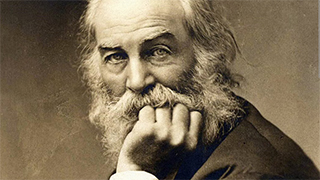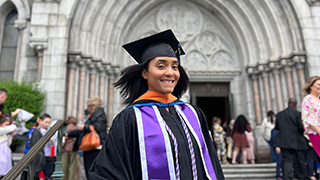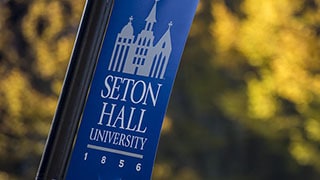Biology Students Aditya Kasina and Marco Fanik Receive Novo Nordisk Scholarship From the Independent Colleges and Universities of New Jersey
Wednesday, April 24, 2024
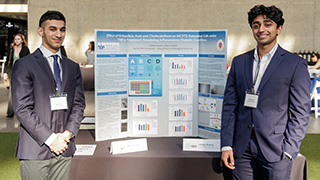
Marco Fanik and Aditya Kasina pictured with their research findings.
In November of 2023, the Independent Colleges and Universities of New Jersey (ICUNJ) awarded Seton Hall Biology students Aditya Kasina and Marco Fanik the coveted Undergraduate Research Symposium Grant, along with the Novo Nordisk Scholarship for their research, "Effect of Orthosillic Acid and Cholecalciferol on MC3T3 Osteoblast Cells under TNF-a Treatment Simulating Inflammatory Diabetic Conditions." This study examined bone fracture healing in diabetic patients and was prepared for the ICUNJ symposium held in March 2024. The pair conducted their research with Jessica Cottrell, Ph.D., associate professor and chair of biological sciences at Seton Hall.
Through careful planning and over three months of preparations, the pair was ready to begin their work in Professor Cottrell’s lab. Beginning with in-vitro testing treatments, Aditya and Marco began testing to see if Orthosillic acid and Cholecalciferol could be used to treat diabetic cells. In doing so, the student team hoped to see if these treatments would accelerate cell proliferation under diabetic conditions. Aditya and Marco were of course excited about the promising results of this study, but they were even more excited when the results of their Undergraduate Research Symposium Grant led to the prestigious Novo Nordisk Scholarship to further support their research.
Research requires trial and error, and Aditya and Marco worked down to the wire to produce the best results for this symposium. In doing so, the two students’ research showed that both the Orthosillic and Cholecalciferol treatments increased cell proliferation and could grow better under diabetic conditions. On March 19th 2024, the pair presented their research at the annual Undergraduate Research Symposium held at Bell Works in Holmdel, New Jersey. In the future, the two hope to combine the Orthosillic and Cholecalciferol treatments to reduce diabetic inflammation. While Aditya and Marco hope to eventually publish, they first want to ensure that when the two treatments are effective when used together, as that would promise the most impactful results. Their next step in the research process will be to work in-vivo with mice to validate whether the treatment works in live organisms.
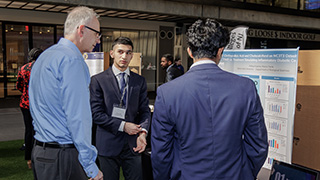
Marco and Aditya pictured presenting their research findings.
This scientific work fostered friendship and taught teamwork as well as biology. Aditya and Marco "relied on each other to get the job done." Overall, the results of their research would not have been possible without their collaboration with each other and with Professor Cottrell. The pair shared that, although they had been friends before their research, "conducting this study has brought them even closer." And heir success would "not have been possible without the help of Professor Cottrell. She has served them as a true teacher and mentor throughout this process."
Seton Hall has a robust Department of Biological Sciences with a wide range of faculty working side-by-side with undergraduate and graduate students as they pursue research in microbiology, virology, immunology and other areas. The department offers both the Masters and Doctoral degrees, and Seton Hall is excited to announce a new 3+2 B.S./ M.S. Program that will enable students to earn a B.S. in Biological Sciences and an M.S. in Molecular Bioscience in just five years. Students interested in STEM research should contact Associate Dean Mitra Feizabadi here and students interested in STEM graduate programs should contact Associate Dean Michael Dooney here.
Categories: Research, Science and Technology




